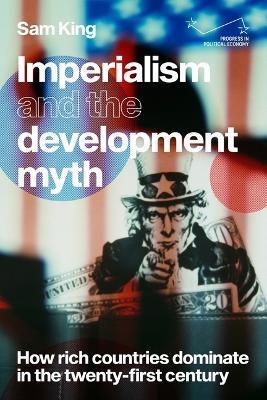Imperialism and the Development Myth: How Rich Countries Dominate in the Twenty-First Century

Imperialism and the Development Myth: How Rich Countries Dominate in the Twenty-First Century
In this book, King argues that China and other societies cannot 'catch up' with richer countries. The contemporary world system is permanently dominated by a small group of super-rich nations that maintain a stranglehold over the global labour process. Globalisation of production since the 1980s means more of the world's work is now carried out in the poorest countries. Yet richer, 'imperialist' regions like North America, Western Europe, Japan and Australia still secure most of the wealth and benefits.
Their monopoly comes from controlling the technologically advanced processes within the overall global division of labour while farming out other processes. Income levels in all the richer countries remain five or ten times higher than in societies like China. The huge gulf between them is actually getting bigger not smaller.
China is widely viewed as 'catching up' economically and threatening their world dominance. This view is false. Through examination of the global division of labour, King's book shows that China's real level of economic development and its concrete economic power is more comparable to Brazil and Mexico than the USA or Germany. China and some other societies have been able to develop limited defensive military capabilities, but it remains impossible for them to catch up economically or for them to emerge as a new group of imperialist societies growing richer by exploiting labour and resources beyond their borders.
Economic imperialism remains the domain of the same nations that have dominated since colonial times. Today's deafening shouts about China's supposed 'threat' to that system distracts us from its ongoing reality.
PRP: 225.00 Lei
Acesta este Prețul Recomandat de Producător. Prețul de vânzare al produsului este afișat mai jos.
180.00Lei
180.00Lei
225.00 LeiLivrare in 2-4 saptamani
Descrierea produsului
In this book, King argues that China and other societies cannot 'catch up' with richer countries. The contemporary world system is permanently dominated by a small group of super-rich nations that maintain a stranglehold over the global labour process. Globalisation of production since the 1980s means more of the world's work is now carried out in the poorest countries. Yet richer, 'imperialist' regions like North America, Western Europe, Japan and Australia still secure most of the wealth and benefits.
Their monopoly comes from controlling the technologically advanced processes within the overall global division of labour while farming out other processes. Income levels in all the richer countries remain five or ten times higher than in societies like China. The huge gulf between them is actually getting bigger not smaller.
China is widely viewed as 'catching up' economically and threatening their world dominance. This view is false. Through examination of the global division of labour, King's book shows that China's real level of economic development and its concrete economic power is more comparable to Brazil and Mexico than the USA or Germany. China and some other societies have been able to develop limited defensive military capabilities, but it remains impossible for them to catch up economically or for them to emerge as a new group of imperialist societies growing richer by exploiting labour and resources beyond their borders.
Economic imperialism remains the domain of the same nations that have dominated since colonial times. Today's deafening shouts about China's supposed 'threat' to that system distracts us from its ongoing reality.
Detaliile produsului









